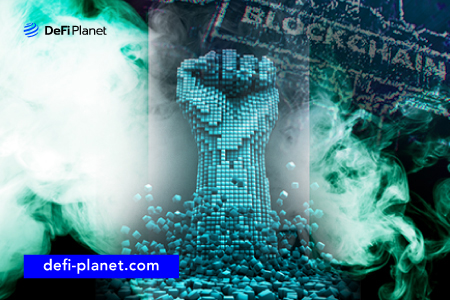Blockchain technology promises innovations that will alter the state of numerous industries and even regions of the world. Nigeria is one country where its citizens have positioned themselves to enjoy some of the effects of the crypto revolution. At the moment, the country is filled with inquisitive young people that are adopting blockchain technology and its various use cases. With unemployment rife within Nigeria and Sub-Saharan Africa, it is not surprising that many are trying new things to survive, and of them is cryptocurrency. Not having access to jobs and having to spend a fast-depreciating fiat currency, the naira, has led some Nigerians to get involved with digital currencies. For Nigerians, therefore, significant cryptocurrency adoption is partly about creating self-employment and partly about protecting the value of monetary resources.
Is Crypto Legal In Sub-Saharan Africa?
Different parts of the world react to cryptocurrencies differently. Some countries like El Salvador are embracing virtual currencies. It was the first country to adopt Bitcoin as a legal tender. But the same level of enthusiasm can’t be said for some jurisdictions.
The case of Nigeria
In Nigeria, the government has discouraged residents from using the technology. The Central Bank of Nigeria (CBN), in early 2021, released a guideline prohibiting Nigerian banks from allowing their clients to use traditional banking services to carry out crypto activities. This means that Nigerian residents were barred from buying crypto with their bank cards or withdrawing fiat currencies from exchanges like Binance. Notwithstanding this rule, it is not a crime to carry out crypto activities as long as the traditional banking system is not used.
Many crypto exchanges that operate in Nigeria have adapted to the CBN directives by incorporating Peer-to-Peer features. Some examples are Binance, Bundle, and Roqqu. This allows for the exchange of cryptocurrencies without the use of banks.
Meanwhile in Ghana…
Ghanaian authorities have not placed a ban on crypto activities in any form, neither has it encouraged them. In 2018, the Bank of Ghana released a circular stating that it was researching ways to use blockchain technology, but ‘it wishes to notify the general public that these activities in digital currency are currently not licensed under the Payments System Act 2003 (Act 662).‘
In the notice to the public, it went on to state, ‘The public is therefore strongly encouraged to do business with only institutions licensed by the Bank of Ghana to ensure that such transactions fall under our regulatory purview. For the avoidance of doubt, the public can always consult our website (www.bog.gov.gh) for a list of licensed banks and non-bank financial institutions in Ghana.’
This contrasts not only with Nigeria but also North Africa, Algeria, for example, where there is an outright ban on crypto activities. According to the Journal Officiel,
“Act. 117. — The purchase, sale, use, and holding of so-called virtual currency is prohibited. Virtual currency is that used by internet users via the web. It is characterized by the absence of physical support such as coins, notes, payments by cheque or credit card. Any breach of this provision is punishable in accordance with the laws and regulations in force.”
Use Cases of Blockchain Technology and Cryptocurrency in Sub-Saharan Africa
With the ban on banking support for crypto activities in Nigeria, people expected that the usage of virtual currency would have reduced drastically. The exact opposite occurred. We explore developments in a range of use cases being used or considered, including by the CBN!
- Cross-border payment
- Low value of fiat currencies
- CBDC
- Means of identification
- Remittance
- Supply chain
Cross-border Payment
With the strict Foreign Exchange (FX) laws in Nigeria, sending fiat currency, such as U.S. dollars, to and from the country is a difficult feat. Purchasing items on a foreign website and paying in dollars is a Herculean task because of the restrictions placed on dollar usage from Nigeria.
Residents that want to pay for items online have to use an alternative payment method. Some online merchants and stores accept popular cryptocurrencies like Bitcoin, Ethereum, and stablecoins.
Apart from the Foreign Exchange restrictions, sending money to other countries is not an easy task. People have to jump through hoops, sign documents, and do other activities before they can send money through the traditional banking channels, but that is not the case in the crypto world. With cryptocurrency, it is easy to send funds to those outside the country seamlessly.
1. Low Value of Fiat Currencies
Currency instability is a big issue in Sub-Saharan countries, especially in Nigeria. Naira’s value has been in freefall since the current administration took power. The unreliable local currency and hyperinflation have encouraged many Nigerians to opt for another store of value, which is cryptocurrency. Many want to convert their naira to U.S. dollars, but it is not easy with the FX restrictions. An alternative that is available to them is stablecoins and other major cryptocurrencies. To avoid the pitfalls of hyperinflation, a significant proportion of young Nigerians have opted for virtual currencies.
2. CBDC
It is not just private individuals and businesses that benefit from blockchain technology. Many central banks around the world are actively researching or planning the issuance of central bank digital currencies (CBDC). China has already trialed its own CBDC, but many other countries are still in the development and conceptualization stage.
The central bank in Nigeria is working on its own CBDC which it hopes will replace the use of cryptocurrencies. The CBN sees one of the major purposes of its CBDC as preventing illegal activity. Cryptocurrencies are not always easy to track because of the anonymity that’s possible, making them attractive, like cash, for money laundering and other activities.
With government-controlled digital fiat currency, central banks can track the location of the CBDC at all times, thereby combating crime, and reducing the risks of tax evasion.
Though this use case has its benefits, it sacrifices the concept of decentralization, which is a basic principle of cryptocurrency. It also does away with any notion of privacy in one’s financial affairs.
Read more about digital currencies here.
3. Means of Identification
Identification is a big issue in Sub-Saharan African countries. Getting a national identity card or rectifying a problem in that aspect is difficult. There have been cases of unscrupulous elements forging identification documents to win contracts and even dupe their unsuspecting victims. It is not easy to verify the identity of individuals or run a background test on them. This can make it easy to commit a crime in a region and move to another part to start a fresh life. Creditworthiness checks can’t be done efficiently because databases to enable them are either almost nonexistent or inefficient to access.
Blockchain technology offers a distributed storage system for data, and it can be customized to store the identities of citizens. Data files stored on the chain can’t be altered because of their immutability functionality, meaning that it will be difficult to falsify identity. With this technology, it will be easy to run background checks on people.
4. Remittance
Countries in this region depend a lot on the remittance of money from abroad, and it makes up a large source of foreign exchange to them. The importance of remittance from the diaspora could not be exaggerated. In an article published on The Punch,
“The Nigerian Diaspora population remitted $65.34bn in three years to boost economic activities in the country, data obtained from the World Bank have shown.
According to the World Bank data, in 2018, the Nigerian Diaspora remittance was $24.31bn; in 2019, it dropped to $23.81bn; and in 2020, it fell to $17.21bn. Remittance inflow made up four percent of Nigeria’s Gross Domestic Product in 2020.
According to the United Nations Department of Economic and Social Affairs, Nigeria had a Diaspora population of 1.7 million as of 2020.”
Using the traditional means of remittance is expensive and comes with red tape. Sometimes, it could take days before the money can be accessed by the recipient.
Cryptocurrency is a big win for remittances. Instead of paying high fees that accrue to banks when transfers are made to Nigeria, those living in the diaspora can opt for virtual currencies that have little or no transaction fees. The transaction speed is fast while taking out the need to use the rigid banking system for remittance.
5. Supply Chain
Many countries have quality standards that agricultural products must have before they can gain entrance into their borders. Many Sub-Saharan countries depend on agriculture and export their products. Tracking the quality of agricultural products may not be easy for farmers and even exporters. Supply chain management is underdeveloped in this part of the world, and gathering accurate data to back the quality claims is almost non-existent.
Traditional methods of tracing the supply chain can be manipulated because of the lack of transparency and standardization. An underlying principle of blockchain is transparency, which is something that supply chains desperately need.
With a supply chain blockchain network, farmers and other participants can assign certifications to their products and others can verify their claims. Goods can also be tracked more accurately as they move through the supply chain.
In Conclusion.
- Cryptocurrency is a currency that has been embraced by both young and old people in Sub-Saharan Africa.
- The technology is changing the traditional means of payment and remittance, which are plagued with issues.
- With the volatility of their fiat currencies, residents in this region are looking for a stable store of value, in the form of stablecoins.
- Cryptocurrency is not a legal tender in Nigeria or other Sub-Saharan countries.
- Nigeria’s ban on banks’ involvement in the cryptocurrency space has not deterred residents from using cryptocurrency in Nigeria.





















